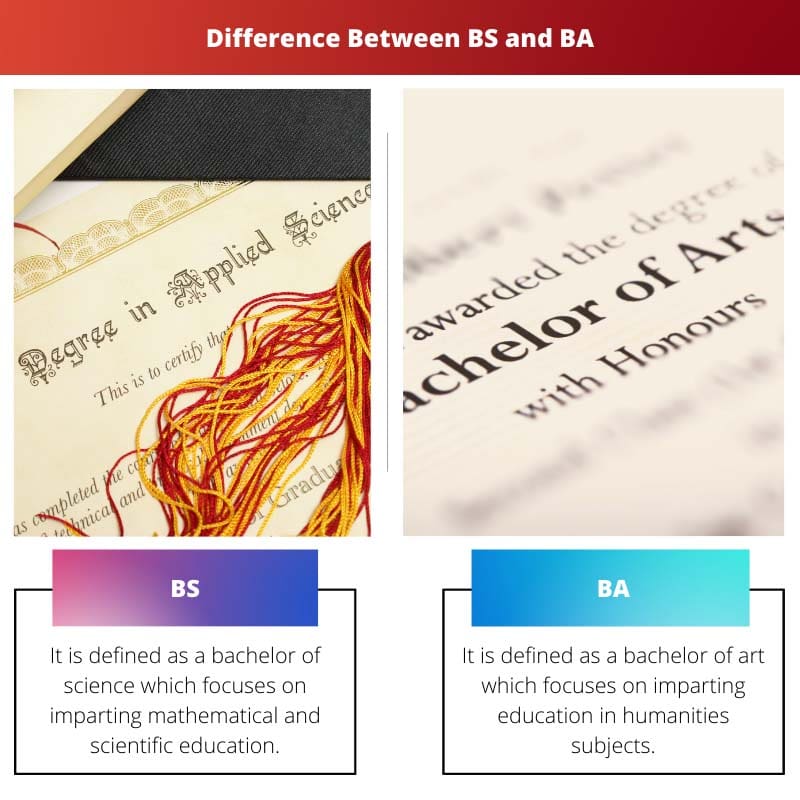Choosing a degree for pursuing graduation is one of the most important decisions in a person’s life. All streams have their pros and cons. As far as the most common bachelor’s degrees are concerned, BS and BA hold high importance.
Key Takeaways
- Bachelor of Science (BS) degrees emphasize technical and scientific knowledge, while Bachelor of Arts (BA) degrees focus on humanities and social sciences.
- BS degrees require specialized coursework and lab components, whereas BA degrees offer greater flexibility and electives.
- Career opportunities differ for BS and BA graduates, with BS holders pursuing careers in research, technology, and engineering and BA graduates entering fields like education, communication, and social services.
BS vs BA
The difference between BS and BA is that the former provides a more scientifically factual degree while the latter is based on the application of arts disciplines. Both vary based on core values imparted. They are similar in duration, but the semester schedule varies due to the practical aspects. Pursuing BS is considered more difficult than pursuing a BA.

The 3 most common science variants include physics, chemistry, and biology. Microbiology is also an emerging attraction.
BA stands for bachelor of arts. Social sciences are the center of attraction under this course. The stream chosen is referred to as humanities.
Comparison Table
| Parameters of Comparison | BS | BA |
|---|---|---|
| Definition | It is defined as a bachelor of science which focuses on imparting mathematical and scientific education. | It is defined as a bachelor of art that focuses on imparting humanities education. |
| Scope of Teaching Methodology | Numerous specializations are offered in BS courses. | BA courses include electives in all fields. |
| Course Schedule | The subjects have a stricter course schedule. | A wider scope is provided due to interdisciplinary approaches. |
| Technicality of Subjects | The BS subjects have technicality as their core. | Humanities courses lack inherent technicality and are majorly theoretical. |
| The Reliability of Double Major | Not required in most cases due to the resume requirements. | It is a lot easier to double major. |
What is BS?
BS is also known as a BSc degree. The technical fields are the center of attraction. BS degrees are chosen for engineering courses or those looking for a profession in the medical field.
The duration of a BS degree is a maximum of three years. Semesters are divided based on the progression of the field. Lesser credits are required, and the intensity of analytical thinking is sans bound.
There is prominent laboratory work involved in such courses since the practical aspect is more important than the theoretical one. Some widely chosen subjects include anatomy, physiology, chemistry, and algebra.

What is BA?
BA is also known as a bachelor of arts. This comparatively easy course requires minimum technical knowledge and maximum learning. In most cases, a language is chosen as a base, and the aspirant chooses other social science subjects as per the future plans.
Administrative services, at times, require deeper knowledge of such subjects. These include geography, history, health policy, environmental education, etc. The creativity quotient is quite high in BA courses.
The former category includes the theoretical aspects like hypothesis generalizations, etc. Less emphasis is on the statistical approach following crucial research work and surveys.

Main Differences Between BS And BA
- A technicality in modules is higher in BS than that in BA. Psychology and communications are two common disciplines.
- A double major is less reliable in BS due to the difficulty in comprehension. BA has an easier double major curriculum.

- https://www.emerald.com/insight/content/doi/10.1108/10748120210431376/full/html
- https://journals.sagepub.com/doi/abs/10.1177/0098628315620874
Last Updated : 13 July, 2023


Emma Smith holds an MA degree in English from Irvine Valley College. She has been a Journalist since 2002, writing articles on the English language, Sports, and Law. Read more about me on her bio page.

The main differences between BS and BA are clearly outlined, allowing individuals to make informed decisions about their degree choices.
The reference links add credibility to the information presented and provide further reading for interested individuals.
The in-depth explanations of BS and BA degrees give readers a thorough understanding of the opportunities and challenges associated with each degree.
The descriptions of the courses and the differences between the two degrees are presented in a clear and concise manner.
An excellent analysis of the technical nature of BS courses and the creative aspect of BA courses is provided in this post.
The distinction between BS and BA explained here provides great insight into the educational pathways available to students.
This article is a well-researched piece that accurately describes the differences between BS and BA degrees in detail.
This post clearly highlights the key differences between Bachelor of Science and Bachelor of Arts degrees. It provides insightful details.
The detailed comparison table summarizes the key points in an easily understandable format.
The detailed descriptions of what BS and BA entail provide a clear understanding of the differences between the two degrees.
The comparison of the technicality of subjects and the reliability of a double major enhances the understanding of the post.
This post provides a comprehensive guide about the difference between BS vs BA, an excellent job!
Knowledgeable people would be able to understand that the main differences get to the core of the scope of the courses.
The chosen streams indeed are subjects that are relevant for today’s challenging job market.
The information provided here will be beneficial for potential students during their decision-making process for degree selection.
Choosing a degree stream leads to confusion, and this post simplifies the complex decision-making process.